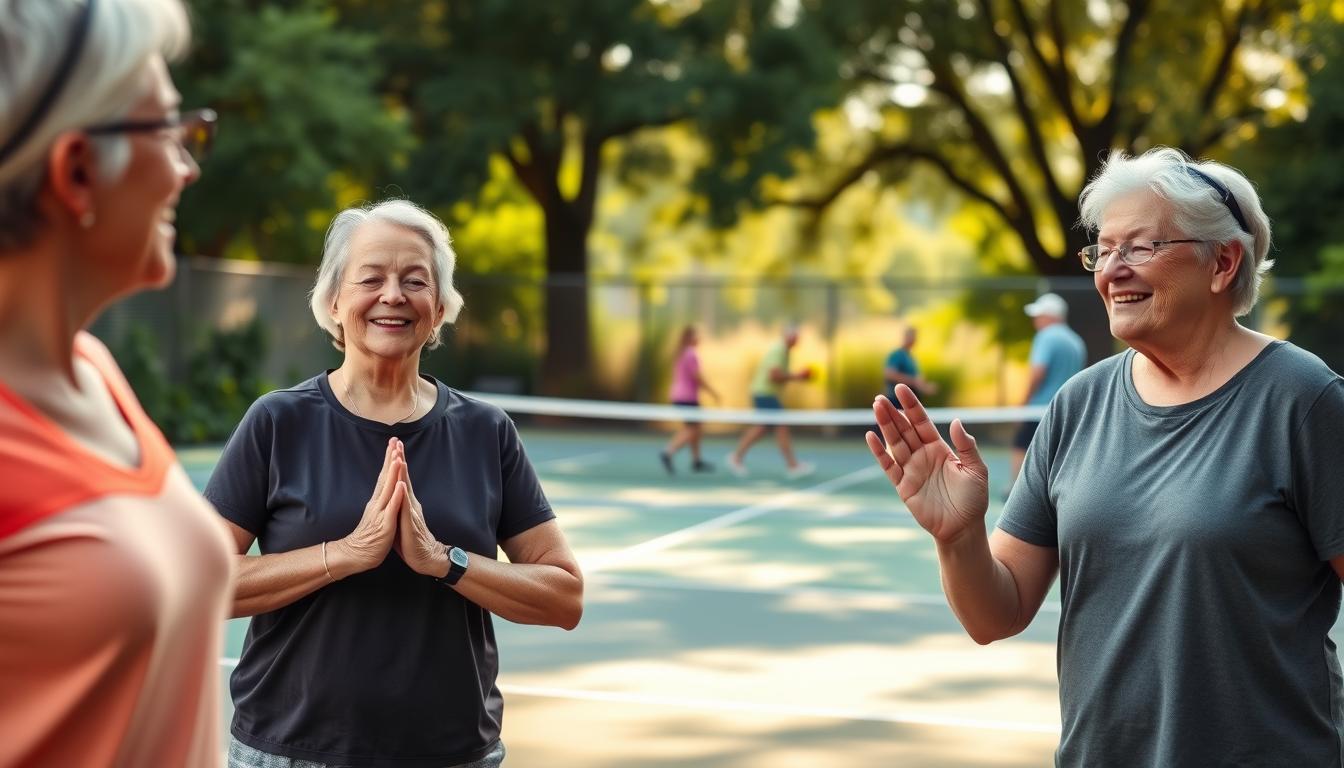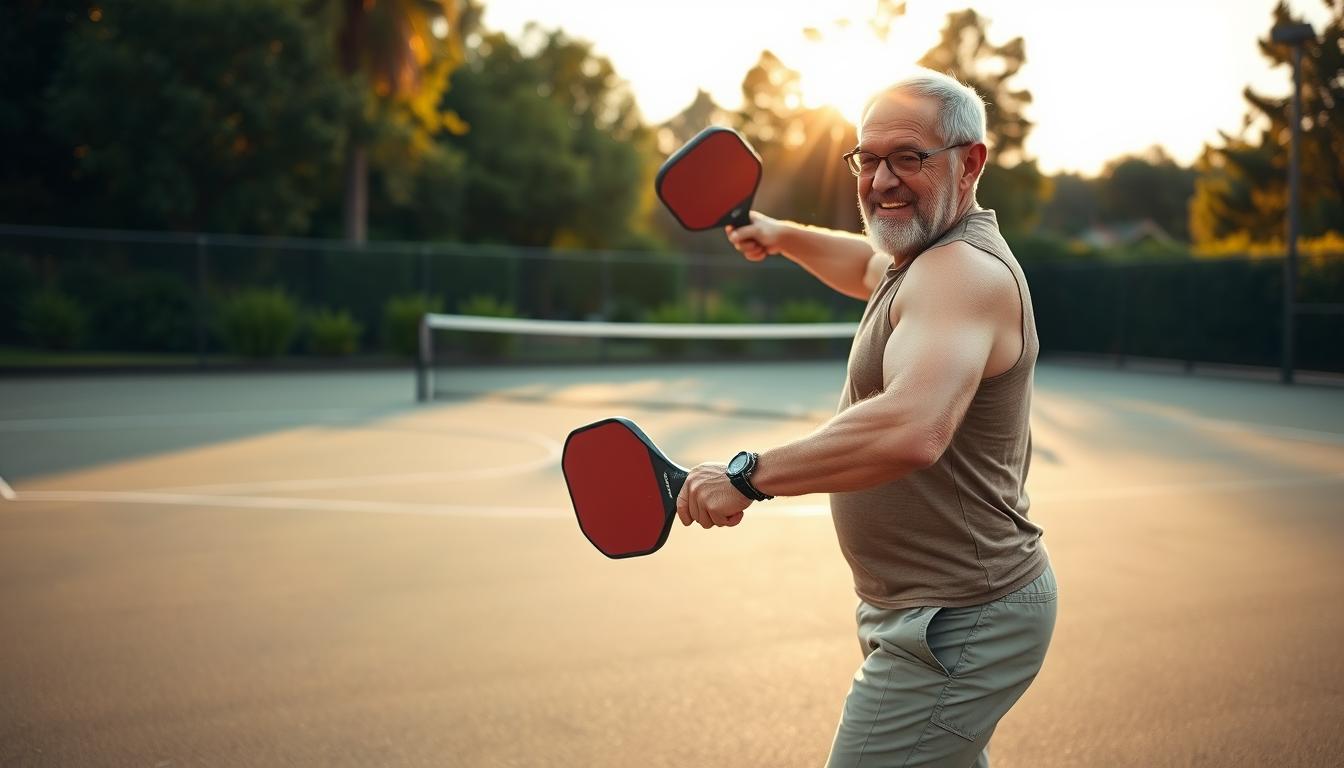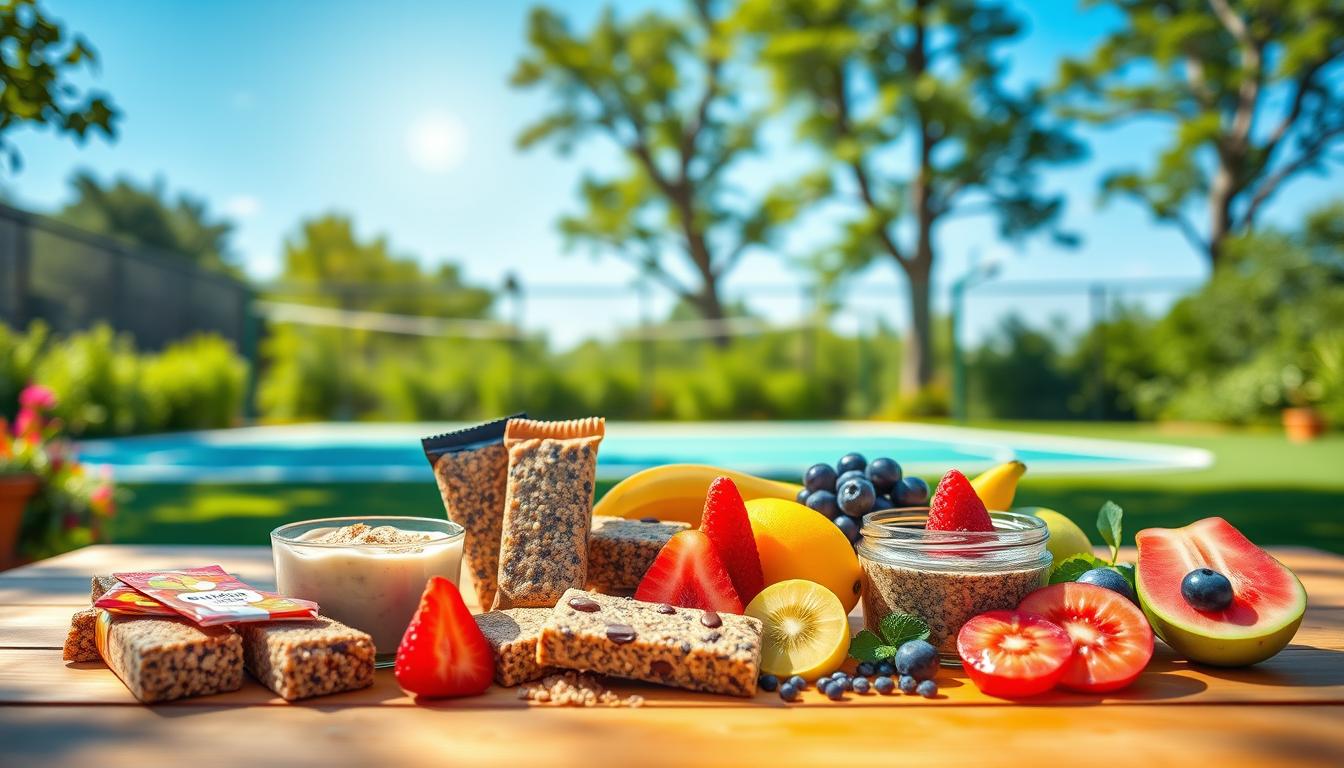Ever thought about how a good diet could change recovery for pickleball players over 50? As more seniors join sports, like pickleball, knowing about vegan nutrition is key. A plant-based diet helps them perform better and heal faster. It’s all about eating right to stay healthy and active.
For older athletes, the right mix of exercise and nutrition is vital. This is especially true as more seniors start playing sports. Let’s see how eating plants can help them get back on the court.
Introduction to Pickleball and Injury Recovery
Pickleball is quickly becoming a favorite among seniors. It’s a fun way to stay active and healthy. This sport combines tennis, badminton, and ping pong, making it easy for older adults to play.
Playing pickleball improves coordination and agility. It also helps seniors meet new people, which is great for their mental health. Studies show that playing regularly keeps seniors active and healthy.
Like any sport, pickleball can lead to injuries, especially for seniors. It’s important to know the common injuries and how to recover from them. Eating the right foods is key to healing quickly and staying healthy.
By focusing on nutrition and recovery, seniors can enjoy pickleball without worrying about injuries. This way, they can keep playing and stay active.
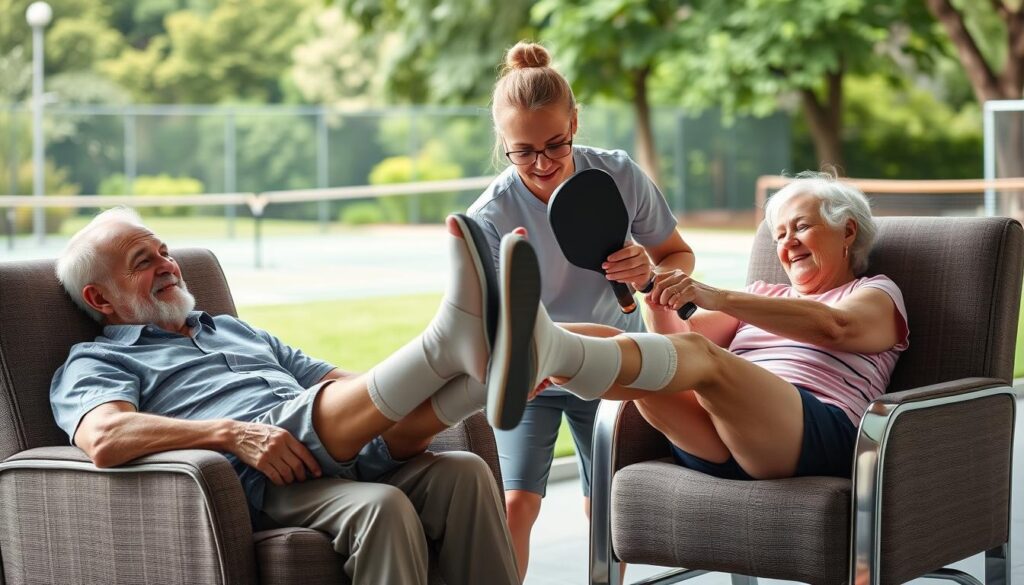
The Importance of Nutrition in Injury Recovery
Nutrition is key for athletes recovering from injuries. A balanced diet boosts health and speeds up healing. For pickleball players, eating right is crucial to recover faster.
Players need to eat enough calories to fuel their bodies. A vegan diet is great for this, packed with nutrients for healing. Foods like leafy greens, nuts, and whole grains help muscles and bones get stronger.
Having lots of energy is important when you’re recovering. A plant-based diet helps players recover faster. Good nutrition is a big help in getting back to playing sports after an injury.
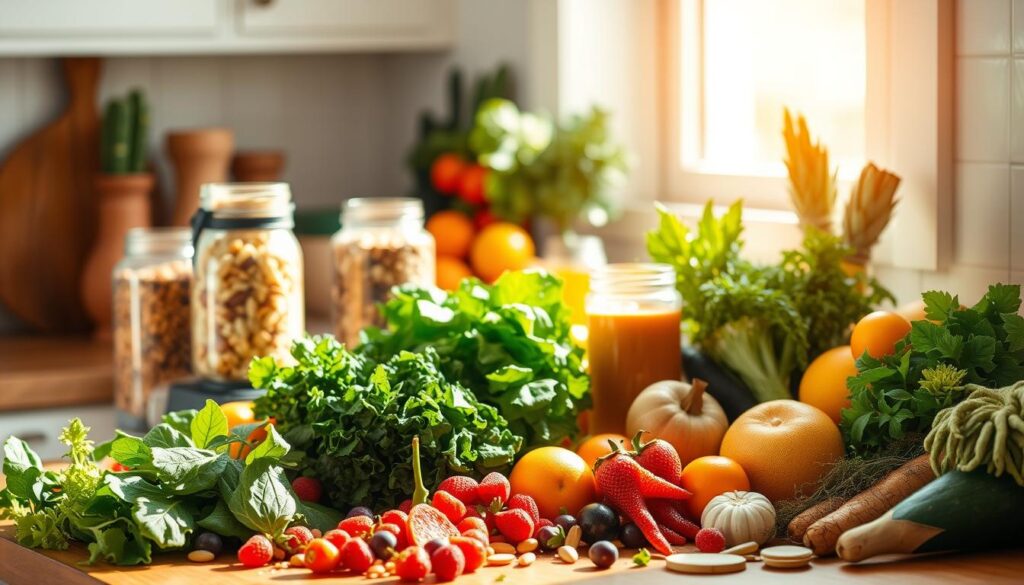
Vegan Nutrition for Injury Recovery Pickleball
Switching to a whole food plant-based diet can really help athletes over 50 recover from injuries in pickleball. This diet focuses on natural foods that give you the nutrients you need to heal. We’ll look at important nutrients for recovery and why a vegan lifestyle is good for healing.
Key Nutrients for Recovery
Vegan food is full of nutrients that help with injury recovery, especially for older athletes. Make sure to eat foods rich in:
- Proteins: Important for fixing muscles, lentils, chickpeas, and quinoa are good sources.
- Omega-3 Fatty Acids: In flaxseeds, chia seeds, and walnuts, these fats help reduce inflammation and aid in healing.
- Antioxidants: Fruits and veggies with antioxidants fight off oxidative stress, which increases after an injury. Berries, spinach, and sweet potatoes are excellent choices.
Benefits of a Whole Food Plant-Based Diet
Choosing a whole food plant-based diet helps recovery by reducing inflammation. It also lowers the risk of chronic diseases, improving overall health. For athletes over 50, this diet:
- Helps maintain a healthy weight, which is good for joints
- Keeps you hydrated and gives you the energy you need to recover
- Supports a healthy gut, which is important for your overall health
Essential Vitamins and Minerals for Healing
Recovering from injuries needs a good nutrition plan, especially for vitamins and minerals. These nutrients are key for healing, helping athletes over 50 heal faster. They keep your health up and help you recover quicker.
Vitamin D and Calcium for Bone Health
Vitamin D and calcium are vital for strong bones. They help prevent fractures, especially in older athletes. Vitamin D helps your body use calcium better, which is important for bone repair.
Not having enough of these can weaken bones. This makes injuries more likely, especially in sports like pickleball.
Vitamin C for Tissue Repair
Vitamin C is important for making collagen, which fixes damaged tissues. It’s key for athletes recovering from injuries. Eating foods high in vitamin C helps you heal faster and get back to playing sooner.
Iron and Protein for Muscle Recovery
Iron and protein are crucial for muscle recovery and energy. Iron helps carry oxygen to muscles, which is needed for them to heal. Protein helps muscles repair and grow, helping athletes regain strength.
It’s important to get enough of these nutrients, especially if you follow a vegan diet. This ensures a balanced recovery.
| Nutrient | Role | Sources |
|---|---|---|
| Vitamin D | Bone health and calcium absorption | Fortified plant milks, sunlight |
| Calcium | Bone repair and strength | Tofu, leafy greens, almonds |
| Vitamin C | Tissue repair and collagen synthesis | Citrus fruits, bell peppers, strawberries |
| Iron | Oxygen transport and muscle recovery | Legumes, quinoa, spinach |
| Protein | Muscle repair and growth | Lentils, chickpeas, tempeh |
Antioxidants and Their Role in Recovery
Antioxidants are key for better recovery, especially for athletes like pickleball players. They fight oxidative stress from hard workouts. Eating fruits and veggies full of antioxidants helps your body recover faster.
Fruits and Vegetables Rich in Antioxidants
To boost recovery, eat foods packed with antioxidants. Here are some top picks:
- Berries (blueberries, strawberries, raspberries)
- Dark leafy greens (spinach, kale)
- Nuts and seeds (walnuts, flaxseeds)
- Citrus fruits (oranges, grapefruits)
- Cruciferous vegetables (broccoli, Brussels sprouts)
The Impact of Antioxidants on Inflammation
Antioxidants reduce inflammation, which happens after injuries or hard workouts. They neutralize free radicals, cutting down inflammation. Studies show that eating foods high in antioxidants helps athletes recover faster.
Eating a variety of antioxidant-rich foods helps pickleball athletes fight inflammation and recover better. Adding these foods to your diet improves healing and supports long-term health. Try to eat a colorful mix of fruits and veggies to get the most benefits.
Protein Sources in a Vegan Diet
For athletes on a vegan diet, finding enough protein is key for injury recovery. Plant-based proteins help repair muscles and boost health. Lentils, chickpeas, and quinoa are top choices, offering amino acids vital for muscle health.
Nuts and seeds like almonds, walnuts, and chia seeds add healthy fats and proteins to meals. Mixing these sources helps athletes meet their daily protein needs, aiding in recovery.
In short, a varied vegan diet is crucial for athletes’ recovery. By choosing different legumes, grains, and nuts, athletes can heal better and stay energized during training.
Hydration and Its Importance in Recovery
Staying hydrated is key for athletes, especially in high-energy sports like pickleball. Dehydration can increase injury risk and slow down recovery. It also lowers performance. Drinking enough water helps keep muscles strong and joints lubricated.
After playing pickleball, athletes need to drink plenty of water or electrolyte drinks. This helps replace lost fluids. It’s important for energy, quick recovery, and injury prevention.
Good hydration strategies can boost recovery. Athletes should drink regularly and check their urine color. Clear urine means they’re hydrated. This keeps them healthy and competitive, reducing injury risks.
Meal Planning for Pickleball Players
Meal planning is key for athlete recovery, especially for pickleball players. It helps busy players eat balanced vegan meals that aid in recovery. By planning meals ahead, athletes can better their nutrition and play better on the court.
Simple Vegan Meal Ideas for Recovery
- Quinoa Salad with Black Beans, Avocado, and Cherry Tomatoes
- Chickpea and Spinach Curry served with Brown Rice
- Sweet Potato and Lentil Stew
- Overnight Oats with Chia Seeds, Almonds, and Berries
- Tofu Stir-Fry with Mixed Vegetables and Cashews
Benefits of Meal Prep for Busy Players
Meal prep saves time for athletes. It stops them from grabbing unhealthy food when tired after a workout. Meal planning offers easy, portioned vegan meals that help with recovery and timing of nutrients. This keeps energy up and aids in recovery after exercise.
Supplements to Consider for Vegan Athletes
Vegan athletes face challenges in getting enough nutrients, especially during recovery. Supplements help fill these gaps. They are key for getting the vitamins, minerals, and protein needed for recovery.
Supplements like vitamin B12, omega-3 fatty acids, and plant-based protein powders are common. Vitamin B12 is crucial for nerve health and is found in animal products. Omega-3s, usually from fish, can be replaced with algae-based supplements to reduce inflammation after exercise. Plant-based protein powders, like pea or hemp, help vegan athletes meet their protein needs for muscle repair.
Before starting any supplements, it’s important to talk to a healthcare provider. This ensures the supplements match the athlete’s diet and health. Tailored nutrition plans, including supplements, help improve recovery and performance.
Common Injuries in Pickleball and Recovery Strategies
Pickleball is becoming more popular among older athletes. However, it also leads to common injuries in this age group. Muscle strains and tendonitis are common, showing the need for good recovery strategies. Knowing about these injuries and how to recover can help players perform better and stay in the game longer.
Muscle Strains and Sprains
Muscle strains and sprains in pickleball happen from sudden movements or bad landings. Symptoms include pain, swelling, and trouble moving. To recover, athletes can try several strategies:
- Rest: Giving the body time to heal is key to avoiding more injuries.
- Icing: Ice on the injured area can lessen swelling and pain.
- Compression: Compression bandages can support the area while it heals.
- Elevation: Elevating the injured limb can help reduce swelling.
Adding gentle stretching and strengthening to a rehab program can help. It makes recovery faster and improves flexibility, lowering the chance of future strains.
Tendonitis and Associated Treatments
Tendonitis is a common injury in pickleball, causing inflammation in the tendons. It often affects the shoulder or elbow, due to repetitive actions. Good recovery strategies aim to reduce pain and help the tendons heal:
- Physical therapy: Custom exercises can strengthen muscles and improve tendon function.
- Heat therapy: Heat before activities can get tendons ready for movement.
- Anti-inflammatory medications: Over-the-counter options can ease pain and swelling.
- Corticosteroid injections: These can offer quick relief for ongoing inflammation.
Having a clear recovery plan helps athletes get back to full function. It also lowers the chance of getting hurt again.
Adapting Your Exercise Routine for Recovery
Athletes recovering from injuries need to adjust their workouts carefully. This ensures safe and effective healing. By tailoring activities, they can stay active without hurting the injured area.
Low-impact exercises are key in the recovery process. Swimming, cycling, or gentle yoga are good options. They help with blood flow and flexibility, which are vital for healing.
It’s crucial to listen to your body during recovery. Athletes should watch for any signs of discomfort or pain. This helps them make the right changes in their routines.
Starting with lighter weights or resistance bands is a good idea. It helps keep muscles toned without putting too much strain. Focus on proper form and controlled movements to support joint stability and recovery.
By modifying their exercise routine, athletes can better recover and return to their sport. Recovery is just as important as training. It leads to a more effective fitness plan in the long run.
The Role of Mental Health in Sports Recovery
Mental health is key in sports recovery. Athletes need more than just physical care. A positive mindset helps them heal faster.
Studies show athletes with good mental health recover quicker. A positive outlook boosts motivation and focus. It also helps them deal with challenges better.
Practices like visualization and mindfulness help too. They keep athletes motivated and connected to their bodies. This helps them feel in control during recovery.
By focusing on mental health, athletes get a full recovery plan. This approach helps them overcome hurdles and come back stronger.
Community and Support for Aging Athletes
Community support is key for aging athletes, especially in sports like pickleball. Playing pickleball helps build social connections. This creates a sense of belonging among players. It also boosts motivation and helps overcome aging challenges.
A supportive community lets aging athletes share experiences and learn from each other. This is very helpful during recovery from injuries. Many find their resilience grows with a strong network around them. This community is not just for friendships but also for emotional support.
Organized events and local leagues help aging athletes improve their skills. They bond with others who share their passion. This keeps them physically fit and mentally healthy as they enjoy the sport they love.
| Benefits of Community Support | Impact on Aging Athletes |
|---|---|
| Motivational Boost | Increased commitment to practices and matches |
| Shared Learning | Improved techniques and strategies through collaboration |
| Emotional Well-being | Reduction in feelings of isolation and anxiety |
| Physical Engagement | Opportunities for regular exercise and skill enhancement |
| Friendship and Camaraderie | Stronger social connections leading to lasting relationships |
Conclusion
Tailored vegan nutrition is key for injury recovery, especially for pickleball players over 50. A diet full of essential nutrients helps heal faster and boosts athletic performance. By focusing on vitamins, minerals, and antioxidants, older athletes can recover better and play more effectively.
Adopting a whole food plant-based diet offers many benefits for injury recovery. It meets specific health needs and supports a long, active life. Adding hydration and vegan protein sources helps repair muscles and replenish energy.
Embracing these dietary strategies can change the game for pickleball players recovering from injuries. By focusing on your health and performance, try vegan nutrition. It will help you recover faster and improve your game, making your athletic journey more rewarding.


